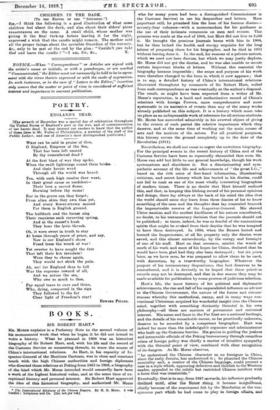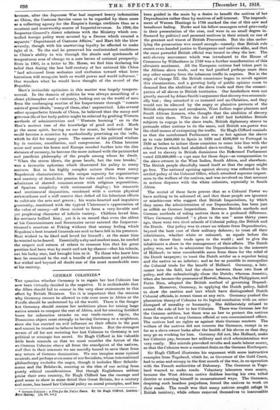BOOKS.
SIR ROBERT HART.* DIR. MORSE explains in a Prefatory Note to the second volume of his monumental work that when he began it he did not intend to write a history. What he planned in 1906 was an historical biography of Sir Robert Hart, and, with his life and the record of the Customs Service as connecting threads, to trace the course of China's international relations. As Hart, in his capacity of In- spector-General of the Maritime Customs, was in close and constant touch with the high Chinese authorities and foreign diplomats who directed those relations at Peking from 1865 to 1908, a biography of the kind which Mr. Morse intended would assuredly have been a work of the highest historical value, and at the same time of ex- ceptional literary and personal interest. Sir Robert Hart approved the idea of this historical biography, and authorized Mr. Mom
• The International Relalions of the Chinese ErsPire. By B. B. Norse. S yds London : Longinana and Co. [25a, net per voLi who for many years had been a distinguished Commissioner in the Customs Service) to use his despatches and letters. More important still, he promised him the loan of his famous diaries— seventy-four volumes—with a memorandum for his guidance in the use of their intimate comments on men and events. This promise was made at the end of 1906, but Hart did not live to fulfil it. He brought the precious journals home with him in 1908, but he then lacked the health and energy requisite for the long labour of preparing them for his biographer, and he died in 1911 without having done it. In the end, for reasons of a private nature, which we need not here discuss, but which we may justly deplore, Mr. Morse did not get the diaries, and he was also unable to secure certain important blocks of letters. Without this material the biography became impossible; the scope and purpose of his work were therefore changed to the form in which it now appears ; that is to say, a detailed history of China's international relations. illustrated throughout by comments of Sir Robert Hart, culled from suoh correspondence as was eventually at the author's disposal. The result, as might have been expected from a writer of Mr. Morse's reputation, is a lucid and authoritative record of China's relations with foreign Powers, more oomprehensive and more systematic in its narrative of events than any of the many works already published on this subject. It is a history which must take its place as an indispensable work of reference for all serious students. Mr. Morse has succeeded admirably in his avowed object of giving to the events of each period the relative importance which they deserve, and at the same time of working out the main causes of acts and the motives of the actors. For all practical purposes, this history covers the ground completely up to the date of the Revolution (1911).
Nevertheless, we shall not cease to regret the unwritten biography.
1 For the principal events in the recent history of China and of the Customs Service have been so repeatedly chronicled that even Mr. Morse can add but little to our general knowledge, though his work systematizes and elucidates it. But a discriminating and sym- pathetic account of the life and achievements of "the great I.G.," i based on the rich mine of firsthand information, illuminating ; criticism, and secret history which lies buried in his diaries, could I not fail to rank as one of the most vitally interesting biographies of modern times. There is no doubt that Hart himself realized this, and that, in keeping this lifelong record of his personal opiniona and doings, there lay always at the back of his mind the idea that the world should some day learn from these diaries of his to know something of the man and the thoughts that lay coneealed beneath the impenetrable reserve of the Inspector-General. His shrewd Ulster caution and the modest kindliness of his nature contributed, no doubt, to his testamentary decision that the journals should not be published ; at times, indeed, he was so fearful of the contentious spirits that might be evoked from their depths that he was tempted to have them destroyed. In 1900, when the Boxers looted and burned the Inspectorate, of all his property only the diaries were saved, and this almost miraculously, by the energy and foresight of one of his staff. Hart on that occasion, amidst the wreck of much of his work and most of his hopes for China, declared that he would have been glad had they also been destroyed ; but six years later, as we have seen, he was prepared to allow them to be used, with discretion, by a trustworthy biographer. Whatever the purport of his testamentary dispositions, this fact deserves to be remembered, and it is devoutly to be hoped that these priceless records may hot be destroyed, and that in due season they may be made available for publication by some process of judicious selection.
Hart's life, the inner history of his political and diplomatic achievements, the rise and fall of his unparalleled influence as adviser to the Chinese Government, the nature of the forces and cireum- stances whereby this methodical, canny, and in many ways con- ventional Ulsterman acquired his wonderful insight into the Chinese mind, together with something distinotly Oriental in his own philosophy—all these are matters of permanent and universal interest. His name and fame in the Far East are a national heritage, and the details of his remarkable career, so far practically unknown, deserve to be recorded Sy a competent biographer. Hart was indeed far more than the indefatigable organizer and administrator who built up the Customs Service. His genius in guiding the jealous and intractable officials of the Peking bureaucracy through countless crises of foreign policy was chiefly a matter of intuitive sympathy with the Oriental point of view, combined with clear recognition of its dangers. As Mr. Morse observes, "be understood the Chinese character as no foreigner in China, since the early Jesuits, has understood it •' he plumbed the Chinese mentality and, a master of the Chinese language, could present a case in a style which, appearing defective and childish to the Western reader, appealed to the subtle but restricted Chinese intellect with a force that was irresistible."
Eventually, that is to say, from 1887 onwards, his influence gradually declined until, after the Boxer rising, it became insignificant, chiefly because of the resentment felt by the Mandarins at the con- spicuous part which he had come to play in foreign affaira, anti because, after the Japanese War had imposed heavy indemnities en China, the Customs Service came to be regarded by them more as a collecting agency for the Empire's foreign creditors than as a constant and trustworthy source of Imperial revenue. In 1906, the Inspector-General's direct relations with the Ministry which con- trolled foreign policy were severed by a Decree which created a separate" Department of Customs Affairs," and Hart felt the blow severely, though with his unswerving loyalty he affected to make light of it. To the end he preserved his undiminished confidence in China's ability to win through the shoals and quicksands of tempestuous seas of change to a sure haven of national prosperity. Even in 1903, in a letter to Mr. Morse, we find him declaring his belief that during the last half-century of her national life China - had- advanced from seclusion and exclusion toward what later historians will recognize both as world power and world influence." One wonders what he would have thought of the record of the Republic.
Hart's invincible optimism in this matter was largely tempera- mental. In the domain of politics he was always something of a closet philosopher and a visionary, looking out on the world of men from the unchanging routine of his Inspectorate through " roseate mists of great ideals," many of them, alas ! unpractical. Like several other sympathetic friends of China, he believed that the many and grievous ills of her body politic might be relieved by grafting Western methods of administration and "Western learning" on to the East's ancient tree of the knowledge of good and evil. Much ki the same spirit, having no ear for music, he believed that he could become a musician by methodically practising on the 'cello, which he did for many years. The essence of his political wisdom ley in caution, conciliation, and compromise. As China became more and more his home and Europe receded further into the dim Instance of memory, he became the more imbued with the patriarchal and pacificist philosophy of the people among whom he dwelt.
• When the storm blows, the grass bends, but the tree breaks," was a favourite aphorism which illustrated his policy in many matters. But in his highly complex nature there were many Napoleonic characteristics. His unique capacity for organization and mastery of detail ; his passion for rules and codes; his strange admixture of shrewd common-sense with religious superstition, ef Spartan simplicity with ceremonial display ; his romantic and sentimental disposition, combined with a certain physical awkwardness and a stiff reserve that defied all his laborious efforts to cultivate the arts and graces ; his warm-hearted and impulsive generosity, combined with the typical Ulsterman's appreciation of the value of money—all these united to form a very lovable' and yet perplexing character of infinite variety. Children loved him, his servants bullied him ; yet it is on record that even the oldest of his Commissioners and Secretaries never entered the Inspector- General's sanctum at Peking without that uneasy feeling which Napoleon's best trusted Generals are said to have felt in his presence. Mart wished to be liked and loved for himself ; at the same time fie wanted to be feared. Essentially a shy and modest man, he needed the respect and esteem of others to reassure him that his great position had been won by merit and not by chance—that his talents, not his lucky star, had brought him to it. To those who knew him best he remained to the end a bundle of paradoxes and problems, but withal and beyond all doubt one of the most remarkable men of his century.







































 Previous page
Previous page